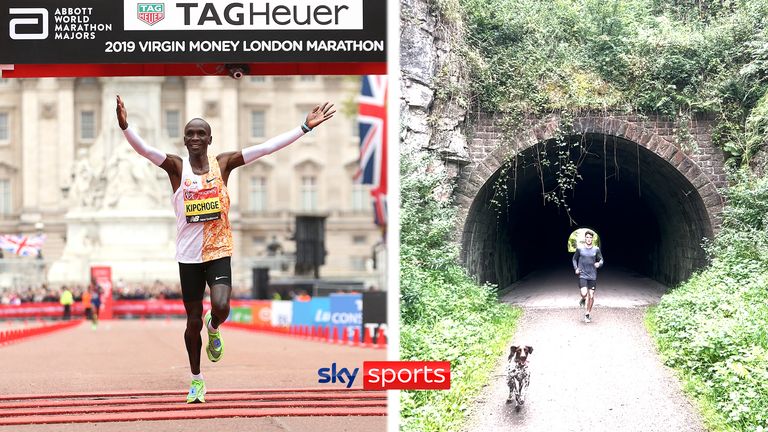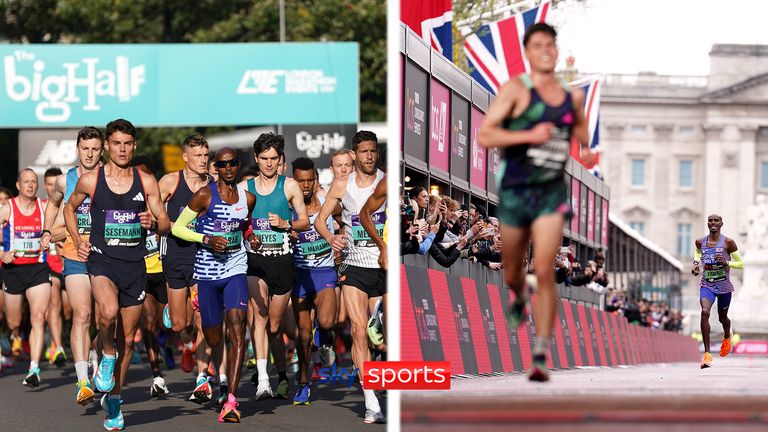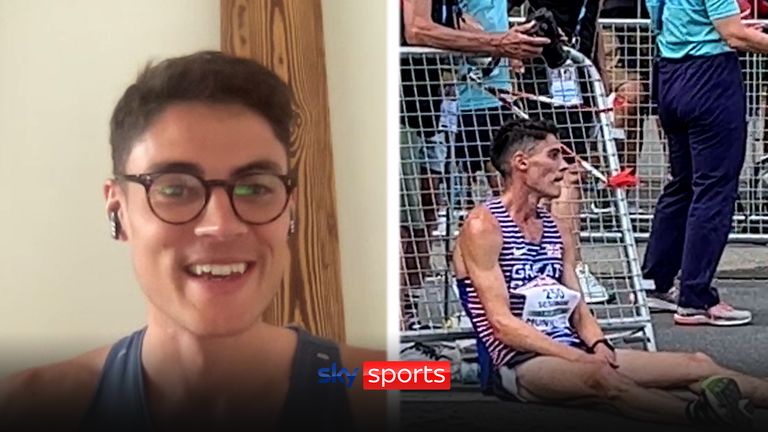Sky Sports spoke to Team GB marathon runner and former doctor Phil Sesemann, who has been on a remarkable journey to achieve his Olympic dream.
By Sam Boggon
Last Updated: 20/05/24 11:31am

When Phil Sesemann outsprinted Sir Mo Farah at the London Marathon in 2023, the junior doctor who combined his love for running with his NHS shifts knew he had a decision to make.
“I liked being a doctor but I wouldn’t say it was ever truly my passion, it was something that I was guided towards but it’s a really difficult job.” the Leeds-based runner told Sky Sports, having made the decision to solely focus on running.
“Fortunately, it got to the point where the running was going well enough that I felt it was worth going all in and giving it a shot.”
Now Sesemann is just a few short months away from competing at the Olympics in Paris. The gamble, clearly, paid off.
The former junior NHS doctor, 31, started his running career on the track competing for Blackheath and Bromley Athletic Club from 2010 to 2020 before making the transition to marathon distance, finding more passion and excitement for the road.
“My coach always saw some potential in it and I found that I was enjoying running longer distances and training weeks in terms of volume.
“That was what motivated and excited me rather than just short distances and speed work on the track.”
Kipchoge and Haile are the names of two of the greatest long-distance runners of all time, but for Sesemann they are his canine training partners who became a key part of his marathon preparation when at home in Leeds.
“I was always going to have running dogs after never having dogs when I was growing up, and Kipchoge shortens to ‘Kip’ quite nicely which got the name over the line with my girlfriend,” he said.
“I am quite fortunate to have the two dogs when going out training on my own to take with me and keep me entertained, which helps me balance the seriousness of training with a laid back attitude.”
The balance of training with animals and humans allowed Sesemann to see running as his passion instead of a job, and helped him prepare for his marathon debut which he made in London in 2021.

Phil Sesemann crosses the finish line during the Virgin Money London Marathon in 2021
This was the first step on his journey to the Paris Olympics, and he marked his 29th birthday in style by finishing seventh as the first Brit over the finish line.
Two years later on the same course, he would catapult himself into the public eye outkicking Sir Mo Farah on his final marathon appearance in an epic sprint finish to the line. “It definitely was a race I went into with a lot of nerves because I knew training had gone well, but in recent races I had not shown great form,” he said.
“I chased him down for the final few miles and then overhauling him in the final straight was obviously a big highlight for me.”
The realisation that he could compete with the best after defeating an Olympic great in that way convinced Sesemann to ultimately give up his medical licence a few months later so he could put his full attention into racing and training.
“It was definitely stressful mentally making that decision,” he said. “But it has been a massive relief and I haven’t looked back and questioned whether it was the right thing to do.”

Phil Sesemann competing against Sir Mo Farah at the 2023 edition of the Big Half in London
Now the possibility of qualifying for his first Olympics was at the forefront of his mind and the Valencia Marathon in December provided him with the first opportunity to do so.
Sesemann ran a personal best of 2:08:48 along the fast streets of Spain becoming the eighth quickest Brit of all time, but still finished just 38 seconds outside of the Olympic qualifying time required.
Focused on his next opportunity, a month of altitude training in Kenya was the next step as he looked to find that extra bit of performance but feelings of self doubt were starting to kick in.

Phil Sesemann training at altitude in Kenya as he prepares for the Seville Marathon
“My coach and training partners constantly reminded me how close I have been and that the altitude training would take me over the line and get me to Paris,” Sesemann reflects.
The Seville Marathon on February 18, a date that will live long in the memory of Sesemann as he faced his last chance to qualify for the Olympics.
Three months after the heartbreak of Valencia and 10 months of pushing his body to the absolute limit later, he crossed the line in 2:08:04 – finishing six seconds inside the qualifying time. His lifelong dream of becoming an Olympian had finally been achieved.
“It’s really difficult to actually describe it and I know that sounds cliché but I almost immediately fell onto the floor and felt quite emotional,” he said.
“I worked really hard and took some risks that paid off so to qualify and to represent Great Britain knowing how proud my family and friends are is huge for me.”
Paris is now on the horizon as he prepares for his Olympic debut and biggest race yet with the knowledge that all the hard work and mental challenges he faced along the way were worth it.
“I’m looking forward to just being on that start line and soaking that all in knowing that I prepared as best as I possibly can and I actually belong here.
“There is definitely some kind of fear thinking of the big hills and heat in Paris but also looking at that as an opportunity to be better prepared and finish quite a lot higher up than my ranking suggests that I will do.”

























+ There are no comments
Add yours